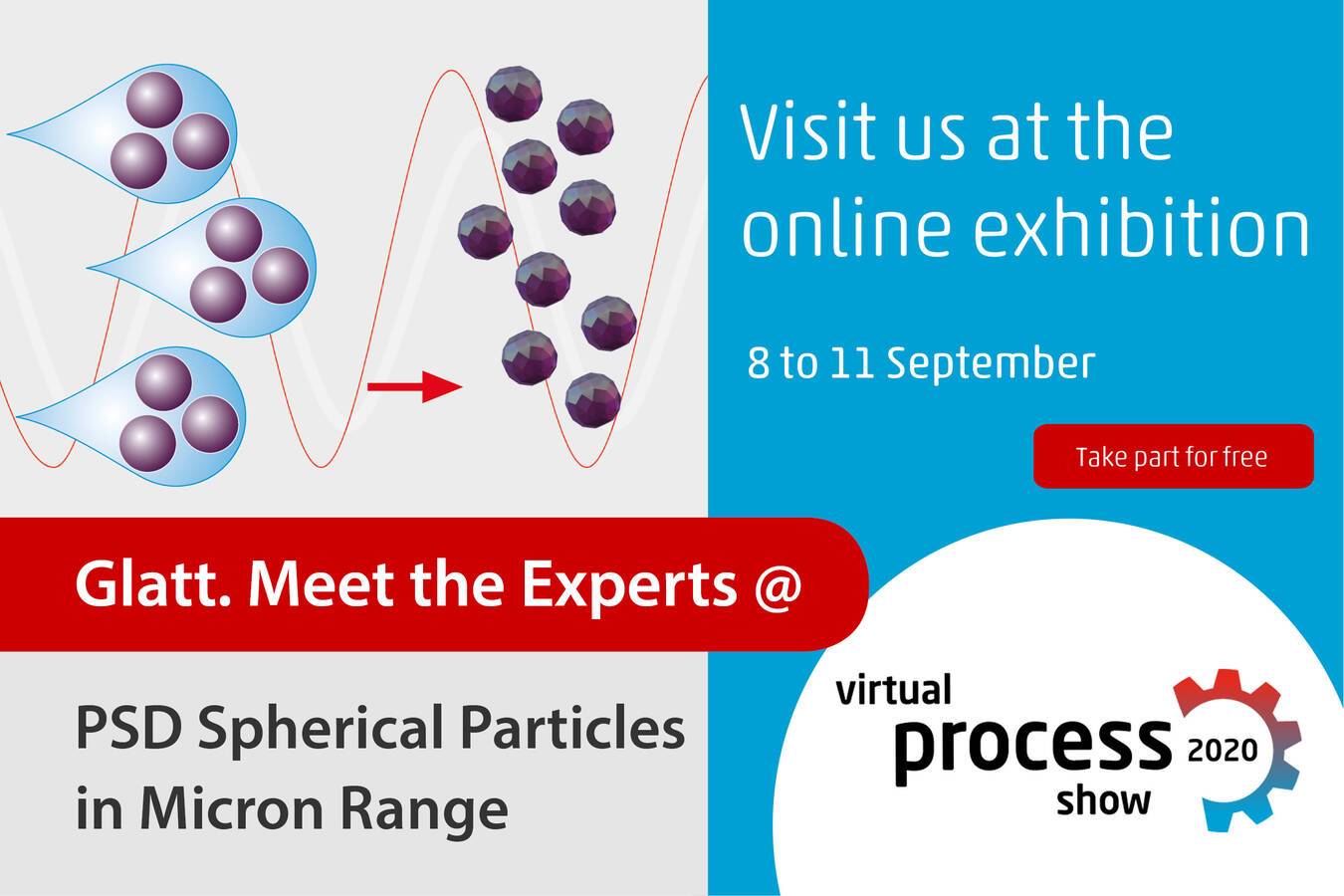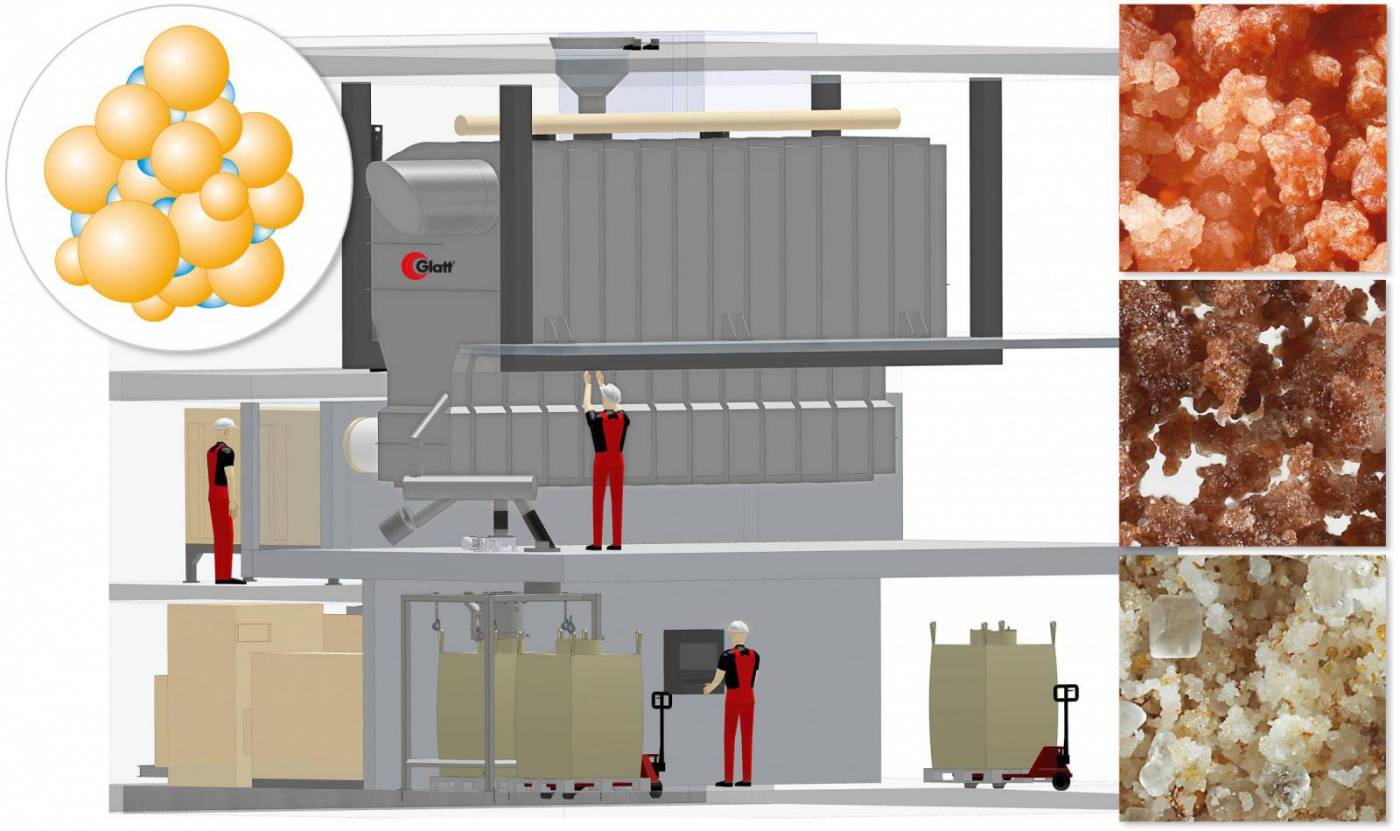The gentle processing of highly volatile oils by fluid bed technology
Sensitive raw materials, especially those that are volatile or of natural origin, require particularly gentle process conditions.
Spray granulation, spray coating and (micro)encapsulation procedures have proven to be methods of choice, as they enable high yields, low temperatures and bespoke properties.
When it comes to cosmetics, product development often focuses on proven, multifunctional ingredients. This is in addition to the ongoing demand for natural ingredients, as consumers increasingly look for effective cosmetic products that neither harm their health nor the environment. Glatt Ingenieurtechnik, the German expert in particle design, process development and plant engineering, offers unique particle processing solutions based on fluidised bed and spouted bed technologies for essential oils, collagens, active substances, stabilizers, enzymes, fragrances, aromas, vitamins and controlled release products, all of which can be optimally produced, protected and refined.
Efficient fluidised and spouted bed processes
Unique flow, mechanical and thermodynamic properties make fluid bed technology a groundbreaking process for optimising powders and liquids. Drying and product design are thus possible in a single step using the same apparatus. A fluidised bed is created when upwardly flowing process air lifts a layer of solid particles, thus fluidising them. In addition to the thermal treatment of solids, fluid bed processes are used for drying tasks, the construction of granulates from powders (spray agglomeration) or liquids (spray granulation) and the coating of particles (spray coating). In the fluidised bed, the particles behave in principle like a liquid. And, being homogenously mixed, a uniform treatment temperature is guaranteed throughout the entire bed. This not only enables a highly controllable drying process, but also the gentle treatment of temperature-sensitive substances.
More stable, effective, customised
The processes by which product properties can be influenced and improved have long been established and are also used in other industries to develop next-generation materials: spray granulation, spray agglomeration, spray coating or (micro)spray encapsulation can be used to optimize the properties and functionality of sensitive raw materials for new formulations. This not only improves solubility, but also ensures that ingredients are homogenously distributed in particles with a broad, adjustable size spectrum. For larger particles, which may have to be coated, a fluidised bed is a must. In general, the functionalised substances can be compacted and dosed better, and thanks to their dust-free properties, are much safer to handle. They are more stable in storage and can be colour-matched to the product design. A functionalised surface ensures tailor-made application properties; solubility, dispersibility, release behaviour and homogeneity are just a few of the parameters that can be specifically adjusted.
Protecting temperature-sensitive substances
When it comes to the heat or temperature sensitivity of active substances, such as essential oils or collagens, spouted bed is the method of choice. Spouted bed technology is also based on the basic principle of fluidising particles with upwardly flowing process air, making it possible to cost-effectively formulate and functionalise such materials in a single process step — batchwise or continuously, in single- or multi-stage processes. Overall, both technologies help to protect volatile substances and enhance handling and dosing. The difference between the concepts lies in the fluid mechanics and process dynamics. This results in significantly higher heat and mass transfer rates for processing sensitive products in shorter times. It’s possible to work at very low temperatures with short processing times, and thermal damage can be avoided at very low product temperatures.
Spray granulation and spray encapsulation
Spray granulation is an ideal process for the production of solid ingredients from liquids and powders. Liquid substances often react unpredictably when they come into contact with each other. But, when converted into dry granules, their reaction properties can be clearly defined. Microencapsulation is based on the spray granulation process and so also delivers compact, dust-free, free-flowing and easy to dose granules from liquid and sensitive raw materials. They can be homogenously distributed and embedded in a protective matrix.
The process lends itself, for example, to the stabilisation and functionalisation of aromas or volatile essential oils. The starting point is normally an oil-in-water emulsion that must be carefully adapted to the process. Hence, the emulsion must have the correct droplet size and stability during processing. Spray granulated/encapsulated particles can be loaded with a high concentration of active substances.
The advantages of this process also include improved shelf-lives owing to reduced hygroscopicity, and better transport and dosing properties of the product. At the same time, the water solubility of the granules can be specifically adjusted. The granules are built up and then dried in a single step: liquids are sprayed onto fluidised particles and subsequently dry on the surface. This results in layered particle growth. The small particles required for further granulate build-up are generated in the process itself. Only the liquid raw material — the emulsion — has to be provided. In addition, it’s possible to feed powdery or fine-particle solids into the process in a targeted manner to either integrate them homogenously into the granulate structure or to use them as external starting cores for granulate growth.
Carrier and coating systems
Apart from the encapsulation method described above, solid actives can be also incorporated in a hydrophilic liquid that is then emulsified and subsequently dried by spray granulation to compact the particles. If lower concentrations are needed, the emulsion can be coated on carriers. The active must be very finely dispersed in the oil and, with suitable binders, will be coated onto powdered components of the formulation or onto inert carrier particles. The composition of the binder or biopolymer used will significantly influence the dissolution and release rate properties of the active. The granule structure can be adjusted to meet any specific requirements by varying the formulation and/or process parameters.
Suitable carrier systems are, for example, xylitol, maltodextrin, lactose and/or crystalline particles such as sugar or salt, or even pellets of defined form and size. Whether the final product is porous and easily dispersible or compact, the final application will dictate the shape and release profile.
Enhanced bioavailability is another requirement when formulating actives in emulsions. In terms of microbial resistance and long-term stability, dried products often offer considerable advantages compared with wet formulations. And when it comes to fragrances, vitamins and other fat-soluble actives, hot melt processing or coating formulations is a very affordable option. Active ingredients dissolved in the lipid carrier are solidified by spray cooling into small particles or pellets. Again, though, selecting the appropriate fat matrix is crucial.
Lab system for specialties production
Anyone who specialises in certain applications but doesn’t produce in the ton range might benefit from a small plant. The ProCell LabSystem is not only a lab-scale system to test spouted and fluid bed processes in the kilogram range, the mobile and flexible system can also be used for the production of certain specialty products using spray granulation from liquids, spray agglomeration from powders, coating and the microencapsulation of liquids. This is made possible by various inserts, which influence the geometry and expansion of the process chamber and, thus, the flow pattern and the fine-tuning of the process parameters.
» originally published in NutraCos InCosmetics, May/August 2020 issue (B5 S.r.l., Italy). To view the original PDF, please follow the link on the right.

